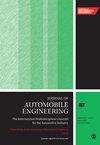新型电动汽车双电机动力总成系统的多目标耦合参数分层优化框架
IF 1.5
4区 工程技术
Q3 ENGINEERING, MECHANICAL
Proceedings of the Institution of Mechanical Engineers Part D-Journal of Automobile Engineering
Pub Date : 2024-07-25
DOI:10.1177/09544070241257556
引用次数: 0
摘要
动力总成耦合参数的协同优化对于提高电动汽车的性能至关重要。然而,复杂的耦合关系和多目标权衡给传统的启发式优化算法带来了挑战,限制了系统性能的发挥。为了提高优化精度和车辆性能,本文提出了多动力源系统的全局参数优化框架。具体来说,该优化框架由三层组成,中间层和底层分别对耦合参数进行多学科、多目标协同优化,以获得由参数最优组合形成的帕累托前沿。此外,决策层利用与理想解相似度排序优选技术,对帕累托前线上的解进行综合评价,科学地得出最优解及权重系数范围。仿真结果表明,优化后的最优解与初始参数解相比,动态性能提高了 15.77%,运营成本降低了 7.37%,使车辆的经济性显著提高。同时,总结了双电机系统参数优化设计的规律性。本文章由计算机程序翻译,如有差异,请以英文原文为准。
A multi-objective coupling parameter hierarchical optimization framework for a novel dual-motor powertrain system of electric vehicle
Collaborative optimization of the coupling parameters of powertrain is essential to improve the performance of electric vehicles. However, complex coupling relationships and multi-objective trade-offs bring challenges to traditional heuristic optimization algorithms, limiting the exploitation of system performance. To improve optimization accuracy and the performance of vehicles, a global parameter optimization framework for multi-power source systems is proposed. Specifically, the optimization framework consists of three layers, the middle and bottom layers respectively perform multi-disciplinary and multi-objective collaborative optimization of the coupling parameters to obtain a Pareto front formed by the optimal combination of parameters. Furthermore, the decision layer utilizes the Technique for Order Preference by Similarity to Ideal Solution to perform a comprehensive evaluation of the solution on the Pareto front to scientifically obtain the best solution and the weight coefficient range. The simulation results demonstrate that the optimized optimal solution improves dynamic performance by 15.77% while reducing operating costs by 7.37% compared to the initial parametric solution, resulting in a significant improvement in vehicle economy. Meanwhile, the parameter optimization design regularities of the dual-motor system are summarized.
求助全文
通过发布文献求助,成功后即可免费获取论文全文。
去求助
来源期刊

CiteScore
4.40
自引率
17.60%
发文量
263
审稿时长
3.5 months
期刊介绍:
The Journal of Automobile Engineering is an established, high quality multi-disciplinary journal which publishes the very best peer-reviewed science and engineering in the field.
 求助内容:
求助内容: 应助结果提醒方式:
应助结果提醒方式:


